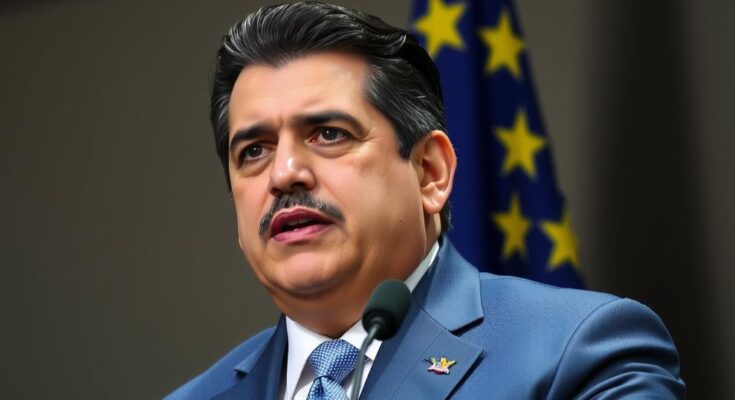The EU condemned Nicolás Maduro’s third-term inauguration, asserting he lacks democratic legitimacy. Kaja Kallas emphasized that the election results were unverified and did not reflect the people’s will. The EU calls for the cessation of unjust detentions and has sanctioned individuals undermining democracy. The criticisms from EU leaders reflect ongoing concerns regarding human rights and democratic governance in Venezuela.
On Friday, the European Union (EU) articulated its condemnation of the inauguration of Nicolás Maduro for a third term as President of Venezuela, asserting that he lacks any democratic legitimacy. High Representative for Foreign Policy, Kaja Kallas, emphasized that the announced election results have not been verified and thus do not reflect the will of the Venezuelan populace. The EU voiced concerns regarding serious allegations of electoral fraud by opposition leaders María Corina Machado and Edmundo González, reflecting a broader sentiment that the Maduro administration is not representative of its citizens’ democratic choices.
In her remarks, Ms. Kallas stated, “Maduro lacks the legitimacy of a democratically elected president” and noted the authorities’ failure to adhere to the desires of the Venezuelan people. Roberta Metsola, President of the European Parliament, called for accountability for Maduro, insisting that he should be subject to legal proceedings rather than being installed into office without genuine support. The European Parliament has recognized Edmundo González, alongside María Corina Machado, as the legitimately elected leaders of Venezuela, following their receipt of the Sakharov Prize for Freedom of Thought this past December.
Demonstrating solidarity with Venezuelans who are experiencing increased governmental repression, the EU urged the administration to cease unjust detentions and to release all political prisoners unconditionally. Furthermore, the Council imposed sanctions on 15 individuals deemed as undermining democracy and human rights in the country. Notably, the EU reiterated that its actions aim to avoid harming the Venezuelan populace or its economy.
The EU’s critical position regarding Maduro’s election and the call for adherence to democratic norms underscores a significant international concern regarding the deteriorating political situation in Venezuela. The diplomatic engagement articulates broader issues surrounding human rights and governance, reflecting the EU’s commitment to safeguarding democracy in the region.
The political landscape in Venezuela has been marked by controversy, particularly surrounding the legitimacy of its elections and the actions of its leadership. Nicolás Maduro has been a contentious figure, having faced accusations of electoral fraud and the suppression of opposition voices. The EU’s recent statements follow a pattern of international scrutiny of Maduro’s government, emphasizing the challenges faced by the Venezuelan people as well as the ongoing issues with political freedom and human rights in the country. The stakes are high as opposition leaders garner support on the global stage, highlighting the tension between the Maduro administration and those who advocate for democratic governance. Sanctions imposed by the European bloc signify a firm stance against perceived violations of democratic processes, reinforcing the EU’s strategic policies aimed at promoting human rights and democratic reform in Venezuela.
In summary, the European Union’s firm response to Maduro’s third-term inauguration highlights its stance on the critical need for respecting democratic principles in Venezuela. With calls for accountability and immediate action against human rights violations, the EU aims to support the Venezuelan populace and uphold the ideals of democratic governance. This situation continues to evolve, with the international community closely monitoring the implications of these developments for both the political future of Venezuela and the well-being of its citizens.
Original Source: www.euronews.com




